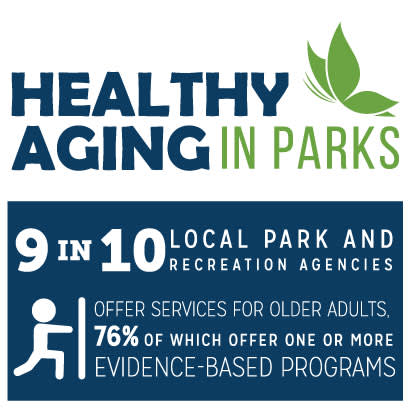Over the past 10 years, the population of individuals ages 65 and older has increased nearly 35 percent — from 37.8 million to 50.9 million — and is projected to increase even more over the next 20 years. Unfortunately, as the older adult population has grown, so has the prevalence of chronic conditions, social isolation and food insecurity.
At least 80 percent of older adults suffer from one chronic condition, and 60 percent suffer from one or more chronic conditions. Furthermore, 1 in every 6 older adults have challenges accessing healthy foods and face the threat of hunger. Together, hunger and chronic conditions limit an older adult’s independence, daily activities and engagement with family and friends —increasing their risk for social isolation, which may affect up to 43 percent of older adults.
For decades, local park and recreation agencies have been offering programs and services to address the diverse health and wellness needs of the growing older adult population. According to the Healthy Aging in Parks Survey Report:
- 9 in 10 local park and recreation agencies dedicate facilities, activities and programming to older adults.
- 44 percent target adults as young as 50 years old for their older adult offerings.
- A variety of programs and services are offered, including exercise classes, field trips, arts and crafts, special events, opportunities to mentor, work and volunteer, nutrition programs and services, among many others.
Healthy Aging is about preserving the health, independence and social connections of older adults. To this end, NRPA’s Healthy Aging in Parks initiative aims to improve the health and wellbeing of older adults through parks and recreation by the following strategies:
- Chronic Disease Prevention and Management: Dissemination and increased sustainable supports for evidence-based chronic disease prevention and management programs.
- Food Security: Improved access to healthy foods.
- Social Isolation: Increased opportunities to establish strong and healthy social connections.
For more information on how you can make the commitment to improving the health, wellness and quality of life of older adults in your community, contact HealthyAginginParks@nrpa.org.


